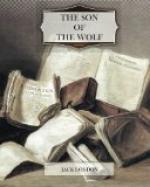‘Come, get a fire started,’ he commanded, drawing out the precious matchbox with its attendant strips of dry birchbark.
The two Indians fell sullenly to the task of gathering dead branches and underwood. They were weak and paused often, catching themselves, in the act of stooping, with giddy motions, or staggering to the center of operations with their knees shaking like castanets.
After each trip they rested for a moment, as though sick and deadly weary. At times their eyes took on the patient stoicism of dumb suffering; and again the ego seemed almost burst forth with its wild cry, ’I, I, I want to exist!’—the dominant note of the whole living universe.
A light breath of air blew from the south, nipping the exposed portions of their bodies and driving the frost, in needles of fire, through fur and flesh to the bones. So, when the fire had grown lusty and thawed a damp circle in the snow about it, Sitka Charley forced his reluctant comrades to lend a hand in pitching a fly. It was a primitive affair, merely a blanket stretched parallel with the fire and to windward of it, at an angle of perhaps forty-five degrees. This shut out the chill wind and threw the heat backward and down upon those who were to huddle in its shelter. Then a layer of green spruce boughs were spread, that their bodies might not come in contact with the snow. When this task was completed, Kah-Chucte and Gowhee proceeded to take care of their feet. Their icebound moccasins were sadly worn by much travel, and the sharp ice of the river jams had cut them to rags.
Their Siwash socks were similarly conditioned, and when these had been thawed and removed, the dead-white tips of the toes, in the various stages of mortification, told their simple tale of the trail.
Leaving the two to the drying of their footgear, Sitka Charley turned back over the course he had come. He, too, had a mighty longing to sit by the fire and tend his complaining flesh, but the honor and the law forbade. He toiled painfully over the frozen field, each step a protest, every muscle in revolt. Several times, where the open water between the jams had recently crusted, he was forced to miserably accelerate his movements as the fragile footing swayed and threatened beneath him. In such places death was quick and easy; but it was not his desire to endure no more.
His deepening anxiety vanished as two Indians dragged into view round a bend in the river. They staggered and panted like men under heavy burdens; yet the packs on their backs were a matter of but a few pounds. He questioned them eagerly, and their replies seemed to relieve him. He hurried on. Next came two white men, supporting between them a woman. They also behaved as though drunken, and their limbs shook with weakness. But the woman leaned lightly upon them, choosing to carry herself forward with her own strength. At the sight of her a flash of joy cast its fleeting light across Sitka Charley’s




